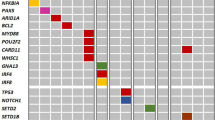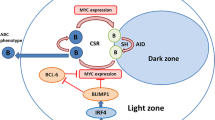Abstract
CD58 is involved in immune recognition of tumor cells via binding of the CD2 receptor expressed on cytotoxic T cells. In diffuse large B-cell lymphoma, mutations of the CD58 gene are reported to contribute to immune evasion of the tumor cells. We previously showed CD58 mutations in three Hodgkin lymphoma (HL) cell lines by whole-exome sequencing. In this study, we confirmed the mutations by Sanger sequencing at the DNA and RNA level and showed low levels or total loss of CD58 mRNA expression in two of the three cell lines. CD58 protein expression as determined by flow cytometry, western blotting and immunohistochemistry was absent in all three mutated HL cell lines. In primary tissue samples, loss of CD58 expression was observed in 11% of the patients who relapse. These data suggest that loss of CD58 is a potential immune escape mechanism of HL tumor cells, especially in clinically aggressive disease.
This is a preview of subscription content, access via your institution
Access options
Subscribe to this journal
Receive 6 digital issues and online access to articles
$119.00 per year
only $19.83 per issue
Buy this article
- Purchase on Springer Link
- Instant access to full article PDF
Prices may be subject to local taxes which are calculated during checkout

Similar content being viewed by others
References
Ferlay J, Steliarova-Foucher E, Lortet-Tieulent J, Rosso S, Coebergh JW, Comber H et al. Cancer incidence and mortality patterns in Europe: estimates for 40 countries in 2012. Eur J Cancer 2013; 49: 1374–1403.
Liu Y, Abdul Razak FR, Terpstra M, Chan FC, Saber A, Nijland M et al. The mutational landscape of Hodgkin lymphoma cell lines determined by whole-exome sequencing. Leukemia 2014; 28: 2248–2251.
Dustin ML, Selvaraj P, Mattaliano RJ, Springer TA . Anchoring mechanisms for LFA-3 cell adhesion glycoprotein at membrane surface. Nature 1987; 329: 846–848.
Springer TA, Dustin ML, Kishimoto TK, Marlin SD . The lymphocyte function-associated LFA-1, CD2, and LFA-3 molecules: cell adhesion receptors of the immune system. Annu Rev Immunol 1987; 5: 223–252.
Dengler TJ, Hoffmann JC, Knolle P, Albert-Wolf M, Roux M, Wallich R et al. Structural and functional epitopes of the human adhesion receptor CD58 (LFA-3). Eur J Immunol 1992; 22: 2809–2817.
Springer TA . Adhesion receptors of the immune system. Nature 1990; 346: 425–434.
Poppema S, Potters M, Visser L, van den Berg AM . Immune escape mechanisms in Hodgkin's disease. Ann Oncol 1998; 9 (Suppl 5): S21–S24.
Sanders ME, Makgoba MW, Sussman EH, Luce GE, Cossman J, Shaw S . Molecular pathways of adhesion in spontaneous rosetting of T-lymphocytes to the Hodgkin's cell line L428. Cancer Res 1988; 48: 37–40.
Ellis PA, Hart DN, Colls BM, Nimmo JC, MacDonald JE, Angus HB . Hodgkin's cells express a novel pattern of adhesion molecules. Clin Exp Immunol 1992; 90: 117–123.
Warren HS, Smyth MJ . NK cells and apoptosis. Immunol Cell Biol 1999; 77: 64–75.
Challa-Malladi M, Lieu YK, Califano O, Holmes AB, Bhagat G, Murty VV et al. Combined genetic inactivation of beta2-Microglobulin and CD58 reveals frequent escape from immune recognition in diffuse large B cell lymphoma. Cancer Cell 2011; 20: 728–740.
Schneider M, Schneider S, Zuhlke-Jenisch R, Klapper W, Sundstrom C, Hartmann S et al. Alterations of the CD58 gene in classical Hodgkin lymphoma. Genes Chromosomes Cancer 2015; 54: 638–645.
Reichel J, Chadburn A, Rubinstein PG, Giulino-Roth L, Tam W, Liu Y et al. Flow-sorting and exome sequencing reveals the oncogenome of primary Hodgkin and Reed-Sternberg cells. Blood 2014; 125: 1061–1072.
Machaczka M, Klimkowska M, Chiang SC, Meeths M, Muller ML, Gustafsson B et al. Development of classical Hodgkin's lymphoma in an adult with biallelic STXBP2 mutations. Haematologica 2013; 98: 760–764.
Jacob MC, Agrawal S, Chaperot L, Giroux C, Gressin R, Le Marc'Hadour F et al. Quantification of cellular adhesion molecules on malignant B cells from non-Hodgkin's lymphoma. Leukemia 1999; 13: 1428–1433.
Poppema S, Visser L, de Jong B, Brinker M, Atmosoerodjo J, Timens W . The typical Reed-Sternberg phenotype and Ig gene rearrangement of Hodgkin's disease derived cell line ZO indicating a B-cell origin. Recent Results Cancer Res 1989; 117: 67–74.
Acknowledgements
This work was supported by a grant from the Abel Tasman Talent Program of the University Medical Center Groningen.
Author information
Authors and Affiliations
Corresponding author
Ethics declarations
Competing interests
The authors declare no conflict of interest.
Additional information
Supplementary Information accompanies this paper on Genes and Immunity website
Supplementary information
Rights and permissions
About this article
Cite this article
Abdul Razak, F., Diepstra, A., Visser, L. et al. CD58 mutations are common in Hodgkin lymphoma cell lines and loss of CD58 expression in tumor cells occurs in Hodgkin lymphoma patients who relapse. Genes Immun 17, 363–366 (2016). https://doi.org/10.1038/gene.2016.30
Received:
Revised:
Accepted:
Published:
Issue Date:
DOI: https://doi.org/10.1038/gene.2016.30
This article is cited by
-
Antigen discrimination by T cells relies on size-constrained microvillar contact
Nature Communications (2023)
-
Using CombiCells, a platform for titration and combinatorial display of cell surface ligands, to study T-cell antigen sensitivity modulation by accessory receptors
The EMBO Journal (2023)
-
A dynamic CD2-rich compartment at the outer edge of the immunological synapse boosts and integrates signals
Nature Immunology (2020)
-
Cell death pathologies: targeting death pathways and the immune system for cancer therapy
Genes & Immunity (2019)



